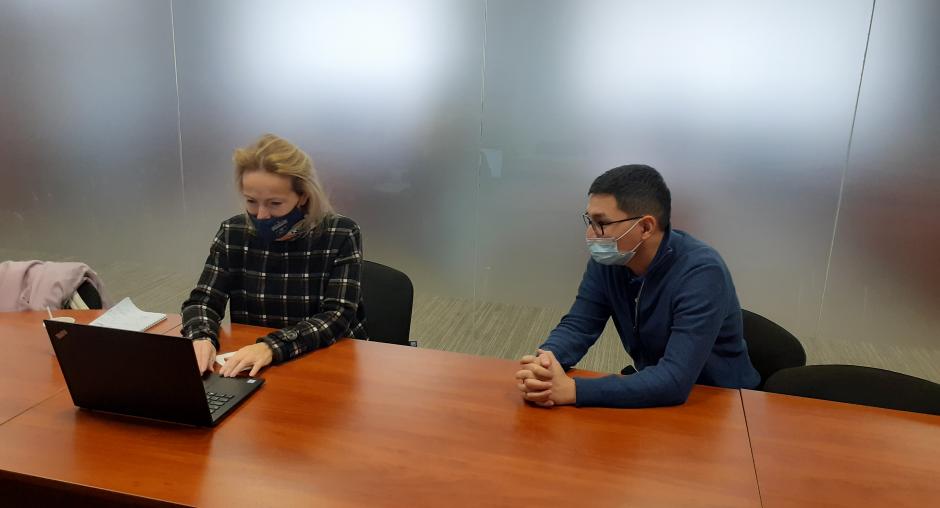A new home in an unfamiliar place: SMM reaches out to Internally Displaced Persons
Looking out the window of his flat in Lviv on an early Monday morning, Arslan, a Monitoring Officer in the Lviv Monitoring Team, reflects on what the day may have in store for him. Today he and his colleague Liliya will meet Nataliya, the co-founder of the ‘Civic Movement of Donbas IDPs’, an NGO that supports individuals, who have been displaced by the conflict in eastern Ukraine, to integrate into their new local community.
Originally from Kyrgyzstan with a background in political sciences and international relations, Arslan joined the SMM in 2021, after working for UNDP as a reporting officer and as a representative of civil society.
Arslan leaves his flat, making his way down cobblestone streets already busy with morning traffic. As he reaches the Monitoring Team’s office in the heart of the city, he meets up with Liliya, the local language assistant. Before she came to work with the Mission, Liliya taught English at the Ivan Franko National University in Lviv. Now, after more than two years with the SMM, Liliya has already become well-informed about IDPs in Ukraine. “There are more than 11,000 registered IDPs in the Lviv region,” Liliya says, “and according to official government reports, in total about 1.5 million IDPs are located across the country.”
Arslan and Liliya set up the conference room in accordance with the Mission’s COVID-19 safety regulations.
They then review their notes, in preparation for the meeting. “Monitoring respect for human rights and fundamental freedoms is an integral part of our mandate,” Arslan says, “We hope that, in our discussion with Nataliya, we will get some useful updates on the work of her NGO.”
A few minutes later, the doorbell rings. Nataliya enters the office and is welcomed by Arslan and Liliya. The three of them sit down and begin their meeting.
Nataliya explains how she left her hometown. With a degree in management and economics, she used to work as the director of a small trade centre in Alchevsk, currently in the non-government-controlled areas of the Luhansk region. Right after the outbreak of the conflict, she left for Lviv with her husband and their three children.
“During the first days of our displacement, we all thought that it would only be for a short period of time and we would return to our homes,” Nataliya says, “Very quickly though, I realized that we would have to stay for much longer.”
Nataliya noticed that most IDPs faced similar challenges, so in 2015 she founded the NGO ‘Civic Movement of Donbas IDPs’ with other IDPs. One of the organization’s main goals is to support IDPs in getting access to adequate, permanent housing.
“Whoever has the means to do so will rent an apartment, but then most of their income is spent covering the rent. Most IDPs wouldn’t have much left over to cover more basic needs, such as food or clothing,” Nataliya explains. “In order to improve their situation, we support IDPs to properly fill in and file all the documents necessary to register for a plot of land, so they can build their own houses. The administrative procedures can be complicated and not everyone has the knowledge or resources to understand how to navigate the bureaucracy.”
“Can you tell us how many IDP families have already been helped in this way, according to your statistics?” Arslan asks.
“Approximately 22 land plots in the outskirts of Lviv were allocated to IDP families,” Nataliya says. “The construction of houses has not yet started, since none of these plots has the necessary infrastructure.” It is for this reason that Nataliya and her colleagues are working on a project to ensure that water, gas, and electricity are supplied to these plots. They have already secured a local authority grant of UAH 90,000 to develop a more detailed plan to provide essential infrastructure.
Nataliya laughs: “Believe me, we have knocked on a lot of doors and will keep doing so.”
As an IDP herself, Nataliya knows how much effort it takes to make all the changes necessary for people to feel at home again in a new environment. “It was difficult for me to settle in, also from an emotional perspective,” Nataliya admits. “Lviv is a very beautiful city, with lovely buildings. It has an opera and a well-respected university. It is rich in culture, history, and is nicknamed ‘little Vienna’ because of that. Thousands of tourists visit the city each year from all over Europe.”
Even though, she still sometimes feels homesick for the life she left 1,300 kilometres away. “Alchevsk is an industrial city, founded only in the late 19th century. There are not many similarities with Lviv, but it used to be my home.”
The meeting naturally comes to an end. Arslan and Liliya thank Nataliya for her visit and agree to meet again soon.
As they walk out of the office, Liliya asks Nataliya if she could ever imagine returning back one day. Nataliya hesitates before answering, saying how difficult it is to contemplate a return in the present circumstances. “I do miss my friends there, but it has been more than seven years since we arrived in Lviv, and now my family and I have found comfort and happiness in this city.”
After Nataliya has left, Arslan and Liliya reflect on the meeting. “It is amazing to see how much energy and passion one person has. Her determination to make a difference is inspiring,” Arslan says. Liliya agrees: “The efforts of people like Nataliya makes the journey of integration into new communities easier for IDPs.”

